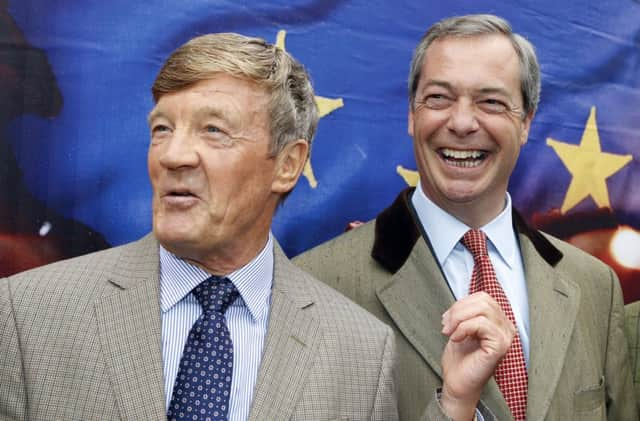Leaders: Ukip bandwagon could give Labour a lift


To date, the rising profile of Ukip has largely been seen as an internal problem for the Conservative Party and for its leader David Cameron. A strong showing by Ukip next month would be likely to strengthen the hand of eurosceptics on the Conservative back-benches.
But a major triumph by Ukip – in particular the likelihood that it will fare better than the Conservatives – will sound louder alarm bells. By playing the immigration card so strongly in its poster campaign, the fear among Conservative strategists is that, even if next month’s election has little political impact in itself, Ukip may well be able to further raise its profile and deny victory to the Conservatives in critical marginal constituencies come the general election next May.
Advertisement
Hide AdAdvertisement
Hide AdAn improving standard of living outlook for households may be lost on those voters persuaded by Ukip that the country has effectively lost control of continuing high levels of immigration and its perceived consequentials on jobs, housing and welfare.
To date, the immigration issue and the growing powers of the European Union in particular have barely registered among Scots voters. But Mr Wilson’s concerns over the nature and dynamic of the EU are not dissimilar to those of Ukip, and indeed have long been echoed by a minority within the SNP. However, he was at pains to stress he did not go along with the Ukip proposition – “in or out with no sophistication”. In a discussion paper, he warns that the EU is slowly becoming an “imperial power” and Scotland should instead be ready to sign up to the European Free Trade Agreement. This option should be put to Scots in a multi-option referendum on Europe after Scottish independence.
Whether Scottish voters will view the European issue as he does – “almost, not quite as important as Scottish independence” is doubtful. While opinion polls show Scots in favour of a referendum being held on EU membership, the same polls show a clear majority in favour of remaining within the EU. Any assertion that Scotland will become more eurosceptic is conjecture at this point and prone to many uncertainties – not least the outcome of the 18 September referendum and clarification of our position with the EU. The immediate issue at present is the damage that a Ukip bandwagon may have on the Conservatives’ electoral fortunes next year – which may help Ed Miliband’s Labour Party into Downing Street.
Name game’s nothing new
What goes round comes round. But in the changing fashion for names – always a cyclical business – it’s taken more than 700 years for the wheel of favour to turn.
Out goes Chardonnay and Kylie. In comes Alfred, Wyatt, Kendra and Elvina.
It’s not clear why Ye Olde English should have returned to favour, but it will almost certainly have something to do with television and films and the characters therein. Step forward Game of Thrones as the chief culprit.
Modern parents may be worried that there are not that many mediaeval names from which to choose. But the literature of the time suggests we are but on the threshold of this new craze. Young parents will now have to familiarise themselves with Beowulf and the Arthurian cycles to keep up with the pack.
The cache of medieval heritage may be conferred by resort to such names for boys as Merek, Carac, Ulric, Borin, Forthwind and Hadrian, while for girls the names of Cedany, Alys, Perenell, Sybbyl and Ysmay would amply convey the air of olde worlde romance and mystique.
Advertisement
Hide AdAdvertisement
Hide AdReaching further back into history for children’s names may present problems of pronunciation and spelling, while there is no evident desire to return to more recent historical eras. However, the cult of celebrity will continue to exercise a magnetic pull for many parents.
So, the only certainty is that when ever-popular television series and characters appear then the naming of infants follows, regardless of how suitable they may be. And the whole thing is cyclical.
Just wait for Columbo McNab, Kojak McPhee or Starsky Hutchison. And blame Dave.